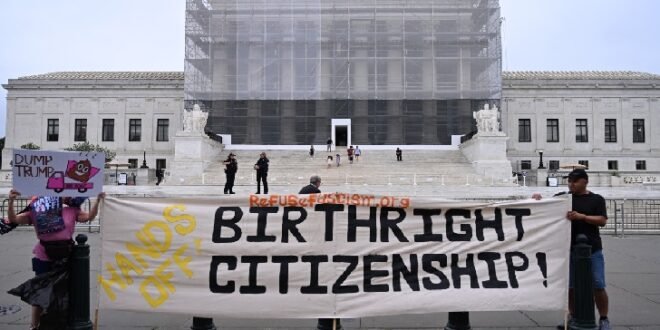29-06-2025
WASHINGTON: The US Supreme Court’s landmark ruling blunting a potent weapon that federal judges have used to block government policies nationwide during legal challenges was in many ways a victory for President Donald Trump, except perhaps on the very policy he is seeking to enforce.
 An executive order that the Republican president signed on his first day back in office in January would restrict birthright citizenship, a far-reaching plan that three federal judges, questioning its constitutionality, quickly halted nationwide through so-called “universal” injunctions but the Supreme Court’s ruling on Friday, while announcing a dramatic shift in how judges have operated for years deploying such relief, left enough room for the challengers to Trump’s directive to try to prevent it from taking effect while litigation over its legality plays out.
An executive order that the Republican president signed on his first day back in office in January would restrict birthright citizenship, a far-reaching plan that three federal judges, questioning its constitutionality, quickly halted nationwide through so-called “universal” injunctions but the Supreme Court’s ruling on Friday, while announcing a dramatic shift in how judges have operated for years deploying such relief, left enough room for the challengers to Trump’s directive to try to prevent it from taking effect while litigation over its legality plays out.
“I do not expect the president’s executive order on birthright citizenship will ever go into effect,” said Samuel Bray, a Notre Dame Law School professor and a prominent critic of universal injunctions whose work the court’s majority cited extensively in Friday’s ruling.
Trump’s executive order directs federal agencies to refuse to recognize the citizenship of children born in the United States who do not have at least one parent who is an American citizen or lawful permanent resident, also called a “green card” holder.
The three judges found that the order likely violates citizenship language in the US Constitution’s 14th Amendment.
The directive remains blocked while lower courts reconsider the scope of their injunctions and the Supreme Court said it cannot take effect for 30 days, a window that gives the challengers time to seek further protection from those courts.
 The court’s six conservative justices delivered the majority ruling, granting Trump’s request to narrow the injunctions issued by the judges in Maryland, Washington and Massachusetts. Its three liberal members dissented.
The court’s six conservative justices delivered the majority ruling, granting Trump’s request to narrow the injunctions issued by the judges in Maryland, Washington and Massachusetts. Its three liberal members dissented.
The ruling by Justice Amy Coney Barrett, who Trump appointed to the court in 2020, emphasized the need to hem in the power of judges, warning against an “imperial” judiciary. Judges can provide “complete relief” only to the plaintiffs before them, Barrett wrote.
That outcome was a major victory for Trump and his allies, who have repeatedly denounced judges who have impeded his agenda. It could make it easier for the administration to implement his policies, including to accelerate deportations of migrants, restrict transgender rights, curtail diversity and inclusion efforts and downsize the federal government, many of which have tested the limits of executive power. In the birthright citizenship dispute, the ruling left open the potential for individual plaintiffs to seek relief beyond themselves through class action lawsuits targeting a policy that would upend the long-held understanding that the Constitution confers citizenship on virtually anyone born on US soil.
Bray said he expects a surge of new class action cases, resulting in “class-protective” injunctions.
“Given that the birthright-citizenship executive order is unconstitutional, I expect courts will grant those preliminary injunctions and they will be affirmed on appeal,” Bray said.
Some of the challengers have already taken that path. Plaintiffs in the Maryland case including expectant mothers and immigrant advocacy groups, asked the presiding judge who had issued a universal injunction to treat the case as a class action to protect all children who would be ineligible for birthright citizenship if the executive order takes effect. (Int’l Monitoring Desk)
 Pressmediaofindia
Pressmediaofindia




